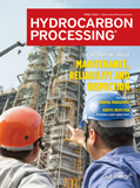API Announces the 5th Edition of RP 572 on Pressure Vessels Inspection Practices
The American Petroleum Institute (API) is pleased to announce the release of the 5th edition of Recommended Practice (RP) 572, Inspection Practices for Pressure Vessels. This edition supplements API 510, Pressure Vessel Inspection Code: In-service Inspection, Rating, Repair, and Alteration, offering greater detail into the inspection practices of various pressure vessels used in the hydrocarbon and chemical industries.
Building on the foundation set by API 510, RP 572, 5th edition, provides an extensive overview of pressure vessel design and construction, along with inspection planning processes, inspection frequency, inspection and assessment methods, repair procedures and record-keeping protocols. The document also emphasizes the importance of safety precautions and notes the limitations of different inspection methods.
When it comes to safety, this latest edition focuses on two key areas:
- Safety of Personnel Working Around Pressure Vessels: Regular inspections are crucial to assess a vessel's current condition and promote its continued safe operation. This edition aims to reduce the risk of failures, thereby increasing employee safety.
- Safety of Pressure Vessel Inspectors: Noting the inherent safety risks associated with the inspection process, RP 572, 5th edition, provides comprehensive guidance to improve inspectors' skills and knowledge, thereby enhancing their safety during inspections.
This 5th edition not only updates foundational content but also incorporates insights on new technologies (for instance, it revises annexes for exchangers and towers). It also adds and reorganizes content to align with other API standards and recommended practices while emphasizing the following:
- Strategies for establishing inspection frequency and performing inspections
- Evaluation of inspection results, including FFS and follow-up actions
- Repair methods and inspection of repairs
- Pressure testing
Finally, it offers guidance for analyzing integrity reports and restructures its content to better align with RP 574, Inspection Practices for Piping System Components.
RP 572, 5th edition, serves as a fundamental reference for API’s Individual Certifications Program (ICP) 510 and API’s Process Safety Site Assessment Program (PSSAP®). As a companion to API 510, API RP 572 is an integral part of the body of knowledge needed for those seeking API 510 certification and who want to be Pressure Vessel Inspectors. For PSSAP, API RP 572 is referenced in the Mechanical Integrity protocol. Mechanical Integrity is a critical piece of a site or company’s overall process safety management strategy, and scoring of the Mechanical Integrity protocol constitutes 25% of a site’s overall score on API assessments. API will be updating the PSSAP Mechanical Integrity protocol with appropriate references to the 5th Edition.
To purchase API RP 572, visit www.apiwebstore.org.






Comments